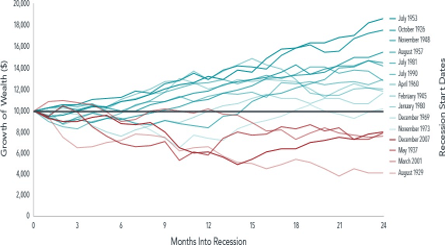Second Quarter 2020 Investment Market Review
Long-Term Investors, Don’t Let a Recession Faze You
With activity in many industries sharply curtailed in an effort to reduce the chances of spreading the coronavirus, some economists say a recession is inevitable (1), if one hasn’t already begun. From a markets perspective, we have already experienced a drop in stocks, as prices have likely incorporated the growing chance of recession. Investors may be tempted to abandon equities and go to cash because of perceptions of recessions and their impact. But across the two years that follow a recession’s onset, equities have a history of positive performance.
Data covering the past century’s 15 US recessions show that investors tended to be rewarded for sticking with stocks. Exhibit 1 shows that in 11 of the 15 instances, or 73% of the time, returns on stocks were positive two years after a recession began. The annualized market return for the two years following a recession’s start averaged 7.8%.
Recessions understandably trigger worries over how markets might perform. But history can be a comfort for investors wondering whether now may be the time to move out of stocks.
Download Second Quarter 2020 Investment Market Review Full PDF
(1) Nelson D. Schwartz, “Coronavirus Recession Looms, Its Course ‘Unrecognizable,’” New York Times, March 21, 2020; Peter Coy, “The U.S. May Already Be in a Recession,” Bloomberg Businessweek, March 6, 2020.
Glossary: Fama/French Total US Market Research Index: The value-weighed US market index is constructed every month, using all issues listed on the NYSE, AMEX, or Nasdaq with available outstanding shares and valid prices for that month and the month before. Exclusions: American Depositary Receipts. Sources: CRSP for value-weighted US market return. Rebalancing: Monthly. Dividends: Reinvested in the paying company until the portfolio is rebalanced.
Past performance, including hypothetical performance, is not a guarantee of future results. Graph In USD. Performance includes reinvestment of dividends and capital gains. Indices are not available for direct investment; therefore, their performance does not reflect the expenses associated with the management of an actual portfolio. Growth of wealth shows the growth of a hypothetical investment of $10,000 in the securities in the Fama/French US Total Market Research Index over the 24 months starting the month after the relevant Recession Start Date. Sample includes 15 recessions as identified by the National Bureau of Economic Research (NBER) from October 1926 to December 2007. NBER defines recessions as starting at the peak of a business cycle.
One Degree
We help families cut through the noise to make confident financial decisions.
